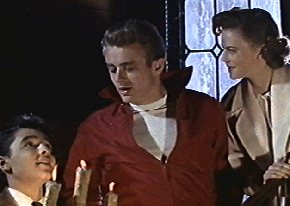Rebel Without A Cause
   
"I stumbled out of the theater, just in shock... people my age came up to me and said, 'What's it about?' and all I could say was 'It's about us!' ...In those days, Hollywood just didn't make movies like that. It was important to suddenly have a movie that was about us." Certainly, this is Rebel's claim to fame: it was one of the first films to portray its teen generation of moviegoers in a semi-realistic (if overly dramatized) fashion. Unfortunately, its success led to a glut of teen exploitation films which still surface now and again (Switchblade Sisters, anyone?). But this film itself is not to blame. James Dean plays Jim Stark, the first in what will be a trio of main characters with first names starting with J. Jim begins the film nearly passed out in a gutter, and is brought into the police station on charges of public drunkenness. There he briefly meets Judy (Natalie Wood) and Johnny, better known as Plato (Sal Mineo). Jim is new in the neighborhood, and we guess this is the way he gets to know people -- through the friendly local law-enforcement offices. The morning after his parents rescue him from the police (thereby revealing a whole set of dysfunctional family problems), Jim runs into Plato and Judy again. Although Plato, an outsider in his own right, is immediately accepting of Jim, Judy is somewhat harder to win over. She runs with a rough crowd, and Jim's initiation into that crowd is equally rough. During the course of the initiation (a high stakes game of chicken), Judy's boyfriend is killed, and she immediately bonds with the sensitive Jim. Meanwhile the boyfriend's gang (including a young Dennis Hopper) decide that Jim has ratted them out to the police and decide to hunt Jim down. The rest of the movie documents what happens that night.
However, what viewers watching the film today will notice above anything else is that Plato is gay. Now, Rebel was made in 1955 and there was a self-censorship board in the U.S. that didn't allow the subject of homosexuality to be portrayed in films, but Plato is about as gay as a character could be in a 1950's movie. Besides Sal Mineo's constant come-hither looks at James Dean, there is also some very interesting dialogue. Here are some of Plato's best lines, delivered in a rush to James Dean: "Hey, you want to come home with me? I mean there's nobody home at my house and heck, I'm not tired. Are you? See, I don't have too many people I can talk to... If you want to come, we could talk, and in the morning, we could have breakfast like my dad used to. Gee, if only you could have been my dad." Okay, at the end it gets into kind of a weird area, but you get the idea. A lot of Plato's problems (his alienation from his family, his ostracism from the school crowd, his urges to kill small animals) can reasonably be traced back to the fact that he is gay and from society's reactions to that. He's completely smitten with Jim, probably because Jim is so self-absorbed that he doesn't realize that Plato is gay or even what gay means. But hey, this is all just theory, right? No one actually comes out and says that Plato prefers the company of men.... Rebel Without a Cause is, if nothing else, a fiercely honest movie (on points other than Plato's sexuality). Dean's portrayal of Jim is both vulnerable and defiant, and the disparities between Judy's sex-kitten school persona and confused, rejected daughter-self at home reveal a lot about the amount of information withheld from teenagers in the 1950's. Jim: Nobody talks to children. We suspect that Rebel Without a Cause (and other films like it) had a lot to do with the changes in Hollywood that were soon to happen; it was certainly a harbinger of the change in American culture looming just over the decade's horizon. In any case, it's a wonderful movie if you can adjust to the time period and realize that if the lines seem cheesy, at least the feelings behind them were real.
 Review date: 2/19/98 
This review is © copyright 1998 Chris Holland & Scott Hamilton. Blah blah blah. Please don't claim that it's yours blah blah, but feel free to e-mail it to friends, or better yet, send them the URL. To reproduce this review in another form, please contact us at guys@stomptokyo.com. Blah blah blah blah. |

